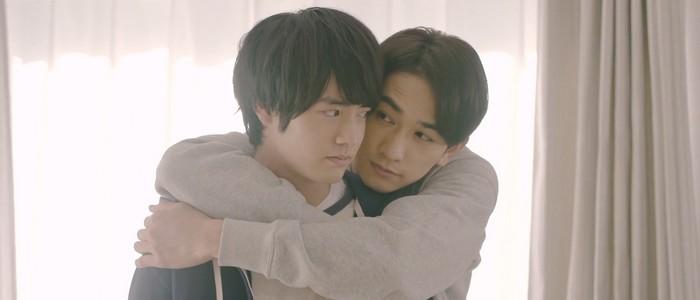
Cherry Magic! The Movie is the film sequel to the Japanese BL series Cherry Magic. This movie continues after the events of the original story. The protagonist is happily in love, although he can still read his boyfriend's mind when they touch. Despite their blissful relationship, a sudden job relocation means he must move away for a long time. Furthermore, coming out to their families weighs heavily on their minds.
The Cherry Magic movie isn't as enjoyable as its predecessor. The sequel lacks the vibrant energy, creativity, and humour that made the original series a classic. Nonetheless, I still appreciate seeing the characters spend time together and strengthen their relationship. Their romance develops enchantingly. This sweet and sincere story delivers well-meaning messages about love.
Cherry Magic Movie Summary
Title:
チェリまほ THE MOVIE
Movie Info:
Japan (2022)
Genre:
Romance
About:
Cherry Magic is a cute & sweet film.
Is Cherry Magic BL?
Yes, Cherry Magic is a BL movie.
Plot
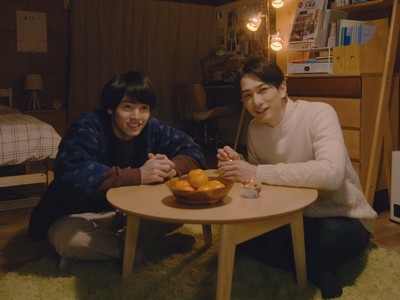
Adachi is an office worker in his early thirties. After his 30th birthday, he gained the unexpected power to hear other people's thoughts if they touched him. Adachi used his ability to discover his well-respected colleague, Kurosawa, had a secret crush on him. Eventually, they responded to each other's feelings. Adachi and Kurosawa began dating, although they concealed the romance from their coworkers and families.
Adachi and Kurosawa are happily in love. At work, they exchange coy glances as they maintain their discreet workplace romance. Outside the office, the couple goes on many dates and spends time at each other's homes. Their relationship is going strong. Kurosawa also uses his boyfriend's ability to convey private messages only he can hear. For example, Kurosawa touches Adachi to express the romantic sentiments in his mind.
One day, Adachi's boss offers an exciting work opportunity. Due to his positive job performance, the company wants to transfer him to help with a new branch expansion. The new position includes a salary increase and a housing allowance. It's the first time Adachi has made significant progress in his career. However, the promotion comes with one caveat. He must relocate to another city for eight months.
Adachi must consider whether to accept the job offer. On the one hand, he looks forward to developing his career. His coworker Urabe thinks he should pursue this valuable opportunity. However, Adachi is reluctant to separate from Kurosawa for so long. He worries his boyfriend would be upset about long-distance dating. Yet, Adachi doesn't communicate these concerns with his boyfriend. Kurosawa is startled to hear the news from Urabe instead of his partner.
Adachi plans to decline the job offer. However, Kurosawa doesn't want his boyfriend to give up this career opportunity because of their relationship. Kurosawa is supportive and encourages Adachi to pursue his aspirations. Adachi suspects his boyfriend hides his genuine feelings beneath the facade. He wants to use his powers to hear what Kurosawa is thinking. Yet, Kurosawa flinches away and wants to keep his thoughts private. "Don't you believe what I just told you?" Kurosawa asks, sounding defensive. The couple must navigate this sensitive dilemma in their relationship.
Cherry Magic Movie Trailer
Cherry Magic Movie Cast
Characters
Adachi
Eiji Akaso (赤楚衛二)
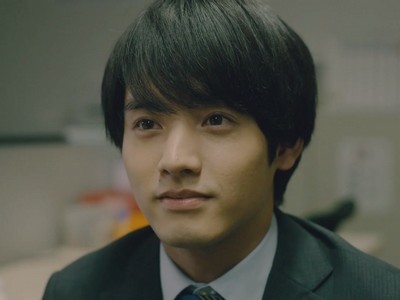
Adachi is an office employee with no dating experience. On his 30th birthday, he gained the sudden ability to hear people's thoughts upon touching them. Adachi used his powers to discover his coworker Kurosawa's secret crush on him. Adachi and Kurosawa have begun dating as they maintain a discreet workplace romance.
Eiji Akaso
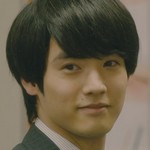
Eiji Akaso (赤楚衛二) is a Japanese actor. He is born on March 1, 1994. His first BL project is the 2020 BL drama, Cherry Magic. He also appeared in the 2022 movie sequel.
Kurosawa
Keita Machida (町田啓太)
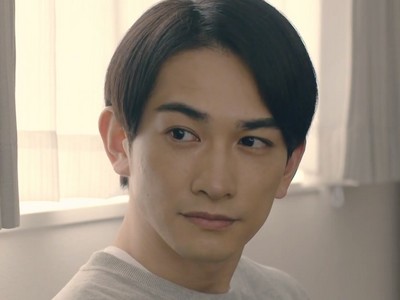
Kurosawa is Adachi's coworker who works in the sales division. Kurosawa has a secret crush on his colleague. Yet, he hides his attraction until Adachi accidentally overhears his thoughts. Kurosawa is thrilled after they start dating. The couple spends much time together, hanging out at each other's homes.
Keita Machida
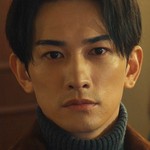
Keita Machida (町田啓太) is a Japanese actor. He is born on July 4, 1990. His first BL project is the 2020 BL drama, Cherry Magic. He also appeared in the 2022 movie sequel. Keita is the star of the 2025 movie, 10Dance.
Supporting Cast
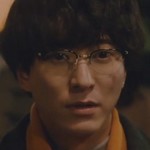
Tsuge
Kodai Asaka (浅香航大)
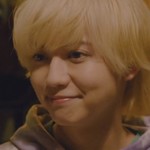
Minato
Goto Yutaro (後藤優太朗)

Rokkaku
Takuya Kusakawa (草川拓弥)
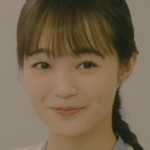
Fujisaki
Ryo Sato (佐藤玲)
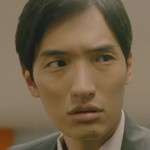
Urabe
Suzunosuke Tanaka (鈴之助)
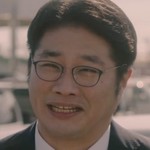
Kusumoto
Suzunosuke Tanaka (鈴之助)
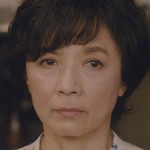
Adachi's mom
Ikue Sakakibara (榊原郁恵)
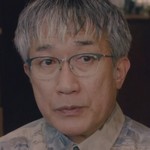
Adachi's dad
Toshiya Toyama (遠山俊也)
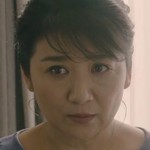
Kurosawa's mom
Yuki Matsushita (松下由樹)
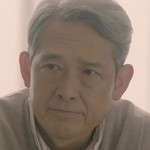
Kurosawa's dad
Shingo Tsurumi (鶴見辰吾)
Cherry Magic Movie Review
Review
Movie Review Score: 8.2
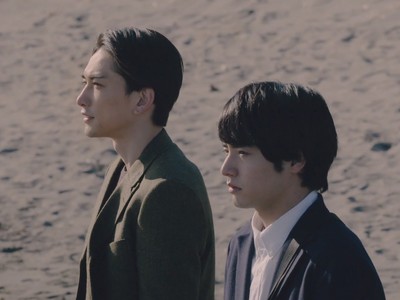
Cherry Magic is one of my favourite BL dramas, charming me with its unique premise, hilarious comedy, and endearing characters. The sequel is not as entertaining. It lacks several qualities that made the franchise successful, like bubbly enthusiasm and zany humour. This film includes mature storylines that are more subdued and less amusing. If I compare the two, Cherry Magic! The Movie hasn't captured the same spark as its predecessor. I miss the vibrant energy of the original series.
Although the Cherry Magic movie may not excite me as much, the story is still enchanting in many ways. The protagonists are sweethearts with genuine personalities. They make a wholesome couple who gets along adorably, goes on cute dates, and gives each other positive reinforcement. The original series shows them at the beginning of the courtship, while this film strengthens their relationship on a deeper level. It portrays Adachi and Kurosawa intimately. I'm grateful to see more of their day-to-day exchanges, solidifying their existing romance.
The original Cherry Magic is like a whimsical fantasy. Adachi gains a magical ability and meets his perfect prince charming. However, this movie goes in a different direction. The opening scene asks hypothetically, "What happens after the fairytale spell is broken?" Cherry Magic thrusts the protagonists into reality and shatters the illusion of an idyllic world. Adachi and Kurosawa face real-life issues that ordinary couples encounter, like career dilemmas or coming out to their families. Unlike the drama, the film's storylines are solemn, weightier, and remarkably realistic.
As much as I loved the Cherry Magic series, the surreal events didn't always feel believable. In contrast, this movie is more down-to-earth. It tones down the quirky scenarios to make room for authentic relationship drama. Adachi and Kurosawa experience hardships that test their bond, but they communicate honestly to overcome the challenges. The film highlights a healthy couple who cherish and respect each other. Cherry Magic handles each storyline sensibly, conveying well-meaning messages about love. A few sentimental moments resonate with me and warm my heart.
Admittedly, the conflicts feel sanitized. Any animosity gets resolved quickly, neatly, and predictably. Cherry Magic approaches the adult melodrama with kid gloves. It still resembles a blissful fairy tale more than gritty real life. In addition, the storylines aren't creative. The series has a unique premise that explores Adachi's telepathy, whereas this movie lacks innovative plots. Other BL dramas have depicted long-distance dating or coming-out journeys with more emotional complexity. Cherry Magic reiterates watered-down versions of familiar tropes and gets outshined.
The Cherry Magic movie has a happy ending, or at least it seems that way initially. The last scene plays around with the theme of illusion versus reality. The clever conclusion adds some ambiguity to the fairytale fantasy. Does Adachi sound disheartened or defiant in his final statement? It's up to your interpretation. Overall, I appreciate the thoughtful themes and positive sentiments in this gentle love story. Even though the film lacks some liveliness, it's still a worthy follow-up to a beloved BL franchise. I always welcome more Cherry Magic in my life!
Summary
Sensible story
The Cherry Magic movie contains well-meaning messages about love. However, I find the sequel less entertaining than the original. The film is missing the vibrant energy and quirky humour.
Healthy romance
The leads have a wholesome romance. They overcome their realistic problems, communicate honestly, and strengthen their bond. They finally kiss in the movie, but don't expect too much lol~
Charming acting
Both actors are as charming as the original drama. IMO, these are the defining roles of their careers. Regardless of their future projects, I'll always see them as Adachi and Kurosawa.
Happy ending
Cherry Magic! The Movie has a happy ending, although the final scene introduces some ambiguity. The film plays around with the intriguing theme of fairytale fantasy versus solemn reality.
Comfortable artistry
The movie comes with solid production values. The visuals feel warm and comfortable. Also, I like seeing the old locations again! Scenes in the office or Adachi's room make me nostalgic.
82%
Cherry Magic! The Movie isn't as funny or imaginative as the original drama. Nonetheless, this sequel is charming. It portrays a sweet couple and reinforces sentimental messages about their love.
Cherry Magic Movie Analysis
Analysis
- Fairytale romance
- Conflict
- Distance
- Honesty
- Physical intimacy
- Coming out
- Adachi's family
- Solidarity
- Kurosawa's family
- Proposal
- The Wizard
- The Prince
Fairytale romance
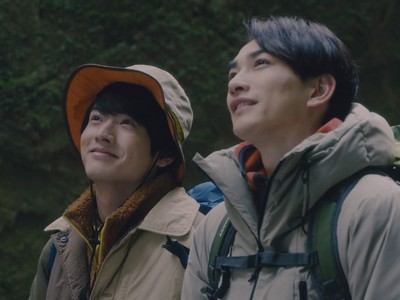
In the opening scene, Adachi picks up a children's book called "The Wizard and the Prince". The allegorical title describes the two protagonists, likening them to fantasy archetypes. Adachi is the "wizard" who gains a magical power and falls in love with Kurosawa, the perfect "prince". This comparison works because the original Cherry Magic is like a modern fairy tale. It conveys an enchanting love story with wholesome characters. The series concludes with a happily-ever-after ending between Wizard Adachi and Prince Kurosawa.
The movie starts on a similar trajectory as the BL drama. The beginning contains many adorable scenes that depict an infatuated couple. One of my favourite moments is when Kurosawa holds Adachi's hand in the elevator and invites him to a date telepathically. So sweet! I react to their coy flirtations like Fujisaki, smiling knowingly from my desk. Teehee~ 😚 As the couple plans their upcoming dates and trips, the fairytale romance flourishes. Life is going idyllically for Adachi and Kurosawa, like nothing can disrupt their bliss.
The Cherry Magic movie lulls viewers into a false sense of comfort, making them feel at ease inside this perfect fantasy bubble. Then, the storyteller lifts the veil. Like any ordinary couple, Adachi and Kurosawa face various personal problems. Reality has infiltrated their storybook romance, forcing the wizard and the prince to confront hardships like work or family. As Adachi states ominously, the fairytale spell is broken. Cherry Magic! The Movie explores a solemn side to romantic fantasies, revealing that no relationship is as blissful as it seems.
Conflict
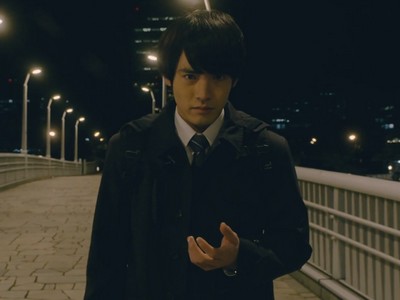
Like a fairytale romance, Adachi and Kurosawa rarely argue about anything. Both are pacifists who like compromising instead of getting into conflicts. Yet, they sometimes compromise too much, putting other people's needs ahead of their own. Both are guilty of this habit, but Kurosawa is especially overeager to appease his boyfriend. He smiles, makes concessions, and acts selflessly for Adachi. This couple never quarrels because Kurosawa is happy to agree to whatever Adachi wants.
Adachi receives a job promotion, which involves relocating elsewhere for eight months. It's an exciting career opportunity, but he worries his boyfriend will be unhappy about the long-distance relationship. Adachi can predict his partner's reaction. On the surface, Kurosawa will say the right things and support Adachi unconditionally. "Whatever makes you happy will make me happy too," Kurosawa gives the perfect boyfriend response. Deep down, he bottles up his discontent. Kurosawa would never voice his honest concerns because he doesn't want to be a burden.
Adachi wonders if Kurosawa is hiding his feelings. He uses his mind-reading powers, but Kurosawa flinches away. "Don't you believe what I just told you?" Suddenly, their tensions go beyond a job offer. It has turned into an issue of trust. Kurosawa's question sounds like an accusation. Do you not trust the sincerity of my words!? Although it never escalates into an argument, Kurosawa becomes guarded. They don't touch each other in the elevator the next day. Kurosawa, who used to be an open book, wants to protect his thoughts for the first time in their relationship.
Distance
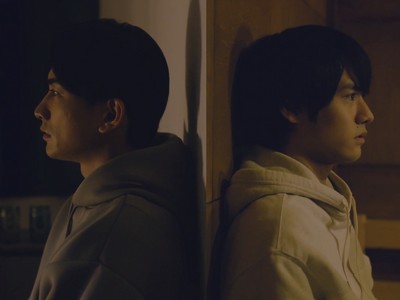
Adachi accepts the job offer and moves to another city for eight months. The physical distance bothers them for obvious reasons, but the more alarming issue is their emotional distance. Adachi and Kurosawa have drifted apart, not sharing their real feelings with each other. They hesitate over their text messages. The words on the screen look positive, but both characters seem tormented in real life. They haven't resolved their previous conflict, and the strain weighs on them mentally.
Kurosawa has resisted Adachi's mind-reading powers because they reveal his complicated feelings about the relocation. Kurosawa wants to support his boyfriend's career. Yet, he secretly wishes Adachi to stay by his side. Kurosawa partially lied to Adachi that night. Whatever makes you happy doesn't necessarily make me happy too. He feels guilty for these selfish desires, prioritizing his satisfaction over his partner's success. So, Kurosawa puts up a façade and pretends to be supportive. He doesn't want to be an emotional burden or influence Adachi negatively.
Adachi feels guilty too. Kurosawa touched a nerve after calling out his boyfriend's trust issues. Kurosawa spoke in such good faith, supporting him unconditionally. Yet, Adachi still doubted his sincerity. You think he's a liar. Also, Adachi used an underhanded way to access Kurosawa's thoughts and invade his privacy. His actions are similar to unlocking your boyfriend's phone to check his messages. Adachi's paranoia oversteps the mutual boundaries between couples. Kurosawa shows his partner so much courtesy and respect, but Adachi hasn't done the same.
Honesty
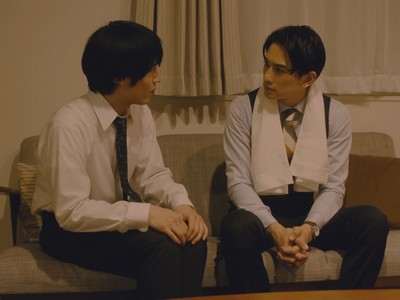
It took a health scare to bring the couple together. We can thank Rokkaku for spreading fake news around the office. "ADACHI GOT INTO AN ACCIDENT!!!" From how he phrased it, you'd expect the worst-case scenario. I assumed Adachi was in critical condition and hooked on life support. The *actual* version of events shows Adachi fainting near a truck. What happened to him is still bad, but it's not a severe crisis. Thankfully, Adachi is fine without sustaining any injuries.
This emotional incident prompted the protagonists to open up to each other, starting with Adachi's apology. Adachi regrets trying to read his boyfriend's thoughts. "I should've asked you to tell me how you felt, but in your own words." Likewise, Kurosawa admits to bottling up his feelings. It's a night of transparency for them both. They learn honest communication is the key to a healthy relationship. In the past, they resolved conflicts by compromising to appease their partner. Now, the couple realizes they should discuss their problems candidly and reach a conclusion together.
It's symbolic that Adachi loses his telepathy after this night. As the couple commits to being honest, no more secrets exist between them. Adachi doesn't need magic to read his boyfriend's mind anymore. Instead, Kurosawa is transparent and shares his genuine feelings. It doesn't matter if they may be unpleasant thoughts. Part of being a couple is trusting your partner can understand these concerns. In a fairy tale, the characters only think positively. In real life, our insecurities shape who we are. It's okay to share with your loved one when something upsets you.
Physical intimacy
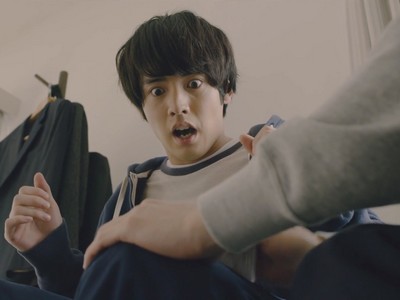
I went into the Cherry Magic movie with zero expectations of physical intimacy. When Kurosawa touched Adachi's leg, that was the closest thing to bodily affection we'd get from this franchise. Otherwise, I knew the characters wouldn't share an on-screen kiss. (Sex was utterly out of the question, of course.) If they smooched, all the BL fans would discuss the moment on social media. Instead, the damning silence already confirmed my suspicions.
The lack of kissing was a minor annoyance during the series, but its omission bothered me more during this movie. Adachi and Kurosawa's kiss is a part of the story. It occurs at the film's climax, symbolizing their reaffirmed love. Yet, we see nothing. Technically, Adachi and Kurosawa kiss in the movie. However, the camera angles deliberately obstruct the view. I can't even include a screenshot because there's nothing to display. When the characters kiss in a love story and all you see is the back of their heads, it's inexcusable.
Here are the facts. Tsuge and Minato kissed in the series. Kurosawa's actor (Keita Machita) also kissed his female costars in other dramas. So, why do Adachi and Kurosawa never have an on-screen kiss, even when the plot demands it? Not every BL story needs physical affection, but there's a difference between *no kissing* and *omitting a kiss*. Omission implies shame, stigma, and indecency. A censored kiss goes against the love and pride that BL should endorse. Oh well. I hope that the Thai remake of Cherry Magic delivers what the Japanese version won't do.
Coming out
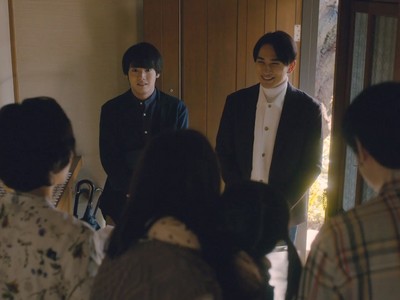
Eventually, Adachi returns to his old job posting. He also moves in with Kurosawa, sharing a cozy flat. As the couple shares precious time together, their fairytale romance appears to be back on track. However, something has been bothering Adachi. His family and the company were notified about his accident, "but not the one I care about the most." The problem with having a secret boyfriend is you can't include him as your emergency contact. Even Rokkaku learned about Adachi's injuries before Kurosawa did.
Until now, Cherry Magic hasn't addressed that Adachi and Kurosawa are in a same-sex relationship. Although we knew they hid their romance at the office, the story didn't explore their reasons. The series focused on the positive aspects of their attraction, never referencing homophobia. In contrast, the movie tackles this uncomfortable topic. Adachi states, "I have to be needed at work, so we wouldn't be separated when our company finds out about us." Adachi verbalizes the discrimination he may face as an openly gay man in the workplace. He said the quiet part aloud!
If Cherry Magic was a fairy tale, I'd like to think there wouldn't be any bigotry. Adachi and Kurosawa live happily ever after without the need to come out. Everyone just accepts their romance as the norm. Yet, the movie shatters this idyllic fantasy. The leads are in a harsh reality, tainted by close-minded judgment. Despite the potential hostility, Adachi tells his family about Kurosawa. No more hiding their relationship. "I need to let everyone know you're precious to me." Coming out is a testament to Adachi's love for Kurosawa, which outweighs other people's hatred.
Adachi's family
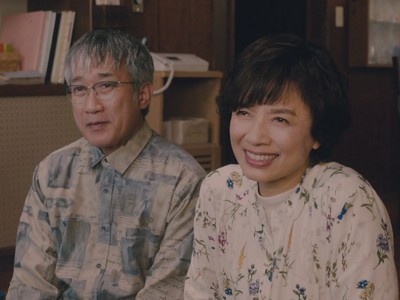
Coming-out stories work best when you're familiar with the characters involved. Knowing the history, personalities, and relationship dynamics add emotional weight to the scenes. Cherry Magic! The Movie lacks that personal touch. Adachi and Kurosawa's families are random people who appear in the movie's second half. The story never introduces them before, but suddenly it trots out the parents for this specific plot. I've seen more complex coming-out journeys in other LGBT+ films, and Cherry Magic gets outshined.
With that said, I appreciate the film's well-meaning messages. It handles the coming-out scenes with sincerity and sensitivity. Adachi's parents reacted well, considering they barely had time to process the shock. You can tell the mom wants to be supportive and understanding. At one point, Adachi asked for his family's opinion. His mom's immediate reply is, "That doesn't matter." Then, she added, "Of course it's okay." Her second response is the sign of someone who wants to emphasize her reassurance. If I heard that from my parents, I would be comforted.
It takes longer for Adachi's dad to express his support. Initially, he stayed quiet while his wife did the talking. Nonetheless, he shows his affirmation during the one-on-one chat. "Now I have someone to play chess with" is a friendly invitation, welcoming Kurosawa to their home in the long term. As positive as his family's responses may be, I'm glad Adachi can't read minds anymore. Telepathy would've made this nerve-wracking experience even more stressful. Can you imagine getting the play-by-play from your parents as you come out to them? No thanks!
Solidarity
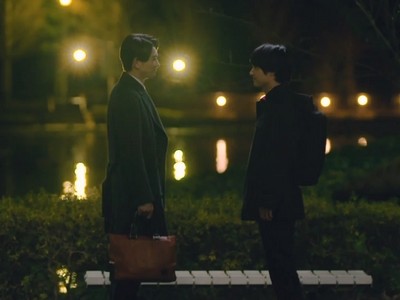
Kurosawa's mom is less welcoming. Initially, she didn't want to meet her son's boyfriend. The dad tells Kurosawa as he's ironing clothes, a clever piece of symbolism. When ironing, you want to smooth something and make it perfect for presentation. It reflects how Kurosawa feels bothered by the rift between him and his parents. Unlike Adachi's family, not everyone has understanding in-laws. Kurosawa wants the meeting to go smoothly, but ironing out the creases will take work.
Kurosawa is troubled by his mother's homophobia. In typical Kurosawa fashion, he keeps these concerns to himself. He doesn't want to upset his partner with the declined invitation. Yet, Adachi's intuition senses something is wrong. Interestingly, Adachi can analyze Kurosawa even without telepathy. The old Kurosawa may not have opened up. He'd continue pretending everything was fine. However, Kurosawa learned his lesson from the previous storyline and trusted Adachi to shoulder his burden. Both characters now communicate with each other to solve their problems.
Kurosawa wants to talk to his parents individually, but Adachi insists on coming with him. "Don't carry the pain alone." It's a powerful statement of solidarity. Falling in love is easy when you're surrounded by fairytale bliss. Finding a partner who motivates you during hardships is the real test of your romance. Later, Kurosawa claims he doesn't care if his parents disown him. Making this grave statement shows he considered the worst scenario extensively. Yet, Adachi continues to be a pillar of strength. He encourages his boyfriend to prioritize harmony over resentment.
Kurosawa's family
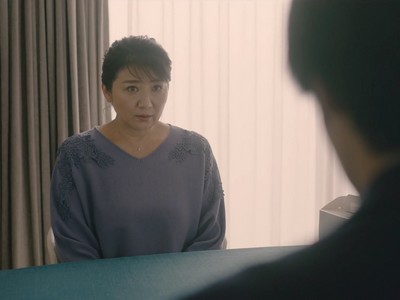
Kurosawa's mom describes her son's relationship as a "regret". It's an emotional word that contains many negative sentiments. Regret implies you've made a mistake. What you're doing with my son is wrong. Not only that, but regret carries a myriad of destructive feelings. Kurosawa's mom associates Adachi's love with shame, sorrow, and suffering. Also, regret is something that can haunt you for a long time. A lingering regret means you may agonize for a lifetime. Your unhappiness lasts forever.
Imagine meeting your mother-in-law for the first time, and she immediately condemns your existence. Hello Mr. Adachi, you're the biggest regret in my son's life. How offensive! What gives her the right to talk to anyone like this just because they're gay!? Despite being insulted, Adachi handles the unwarranted confrontation with class and humility. He only has one argument. Adachi loves Kurosawa. And they'll continue loving each other to prove there are no regrets. In fact, Kurosawa's mom will be the one to regret doubting their love.
Eventually, Kurosawa's mom changes her stance. I don't know how bigoted minds work, but something Adachi said must've clicked with this homophobe. Suddenly, she's all smiles and acting hospitable. Anyway… Kurosawa's dad is far more enlightened and states, "The more happy people there are, the merrier. I believe your lives are yours to live." Oh my god, perfect response. 10/10. Can the ignorant mother take a page from her progressive husband? You can tell Kurosawa got all his good genes from his dad, not his mom.
Proposal
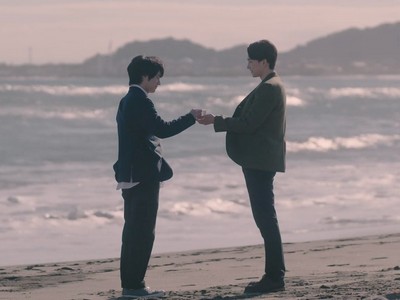
Adachi and Kurosawa have defeated the final boss, taming the homophobic beast. To be honest, they don't need parental approval to live happily. However, this family support provides immense relief, like lifting a mental burden. Coming out also confirms how much they want to be together. If there's one lesson you gain from coming out, it strengthens your conviction. A gay couple wouldn't endure this stressful ordeal unless they're determined to be with each other.
After the family visits, Adachi and Kurosawa stroll along the beach. Kurosawa takes out a ring. It's a simple ring with no fancy embellishments. "When you said you love me, you made my heart skip a beat," Kurosawa tells his partner. As they exchange rings wordlessly, a soft melody plays in the background. Kurosawa mouths something to Adachi, but we can't hear what he says. He leans closer and whispers into Adachi's ear. Once again, the movie deliberately excludes the audio. We only see Adachi nod his head in response. He has agreed to whatever Kurosawa told him.
The audience can deduce the subtext. This scene is a proposal, and Kurosawa has asked Adachi to marry him. However, Cherry Magic makes a curious choice to omit the actual words. We see Kurosawa whisper unintelligibly, like an intimate secret between two lovers. The film wants to avoid labelling this proposal. Calling it a "marriage" sounds disingenuous since these men can't legally wed in Japan. Calling it anything else seems less romantic, dampening the moment. The story chooses to remain ambiguous. It focuses on the celebration of love instead of the vocabulary.
The Wizard
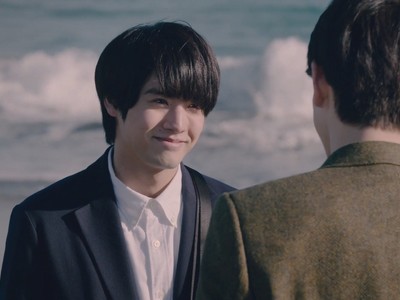
Adachi was blessed with a magical gift at the start of Cherry Magic. He can read people's minds and learn their inner desires, including Kurosawa's secret crush on him. This superpower has turned an ordinary guy like Adachi into an extraordinary wizard. Although Adachi uses his ability responsibly, he often relies on it to navigate his romantic relationship. He likes hearing Kurosawa's thoughts, which are sweet, giddy, and wholesome. Adachi can understand Kurosawa better, bringing them closer together.
Yet, Adachi's power gets him into trouble during the movie. It has made him question his boyfriend's sincerity. You say that you support me, but do you really mean it? His telepathy turns into a verification tool. As Kurosawa becomes more guarded around him, Adachi corrects his methods. Instead of probing his boyfriend's thoughts, Adachi asks questions, starts dialogues, and communicates openly with him. He uses an organic way to relate to Kurosawa instead of exploiting his magical ability. It leads to a healthier relationship that is established on mutual trust.
Adachi loses his telepathy midway through the film. Yet, he remains in sync with Kurosawa. Adachi has sharpened his intuition, allowing him to decipher Kurosawa's feelings. He senses when his boyfriend is delighted, distressed, or doubtful. Likewise, Adachi becomes more sincere. He speaks from the heart to win over Kurosawa's mom instead of finding the right words to appease her. Without realizing it, Adachi has gained a new power called empathy. He can connect to other people's emotions and understand their thoughts, even without the need for magic.
The Prince
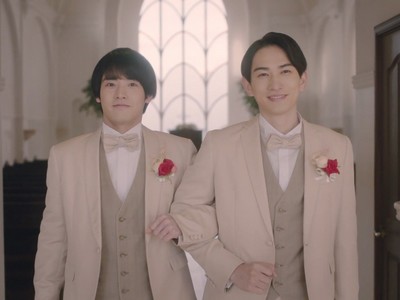
Kurosawa was the picture of perfection when Cherry Magic began. Adachi admired his handsome, accomplished, and beloved coworker, who displayed a winning personality. Even his thoughts are impossibly wholesome. Once they started dating, Kurosawa was also the perfect boyfriend. He doted on Adachi and supported his every endeavour. Kurosawa appeared like a modern prince, the type of fantasy man that stepped out of a storybook. He seemed flawless.
Kurosawa comes across as perfect because he's adept at masking the blemishes in his life. He has a habit of bottling up his unhappy thoughts, undesirable emotions, and unresolved tensions. When his boyfriend must relocate for work, Kurosawa pretends to be the supportive partner. Secretly, he feels tormented. When his mother doesn't want to meet his boyfriend, Kurosawa distances Adachi from the conflict. Kurosawa's impeccable fairytale persona is just an illusion. In reality, he suffers from doubts and distress like everyone else.
Adachi encourages Kurosawa to open up about his imperfections. Adachi doesn't just want the idyllic fantasy from his partner. He can also accept the harsh reality, no matter how painful. Kurosawa learns to share his vulnerable moments, allowing Adachi to shoulder his emotional burdens. Their relationship strengthens because Kurosawa communicates more, even if it sometimes involves negative experiences. This prince doesn't have to fight his battles alone. He has a loyal wizard supporting him, and they can face every hardship together as a formidable team.
Cherry Magic Movie Ending Explained
Ending
Happy Ending
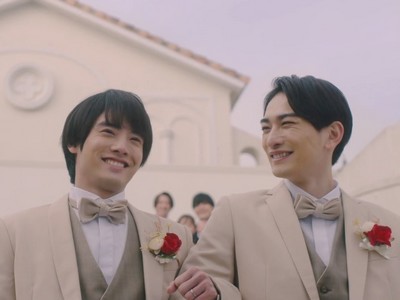
The Cherry Magic movie has a happy ending where Adachi and Kurosawa get married. After coming out to their families, Kurosawa proposes to his boyfriend on the beach. Adachi accepts with a tender smile. Kurosawa is prepared for this occasion, and the two lovers exchange rings. They fit perfectly on each other's fingers. Later, Kurosawa giggles that he secretly took his fiancé's measurements while sleeping. Adachi laughs, "That's so you."
The next scene jumps forward to their wedding day. Adachi and Kurosawa, dressed in their cream-white wedding suits, stand before the chapel doors. They glance at each other and join hands. Then, the doors swing open for the couple to march forward with bright smiles. It's a joyous occasion with everyone in attendance, including their friends, coworkers, and families. Tsuge, Minato, Rokkaku, Fujisaki, and Urabe throw confetti in the air. Meanwhile, their parents clap happily as the newlyweds march down the stairs. Kurosawa's mom is overjoyed and looks genuinely happy for them.
Suddenly, the ceremony ends. The movie transitions to the opening scene, where Adachi stands before the bookstore. He reads a storybook titled "The Wizard and the Prince," which features two male characters getting married. Adachi closes the book and joins Kurosawa on an outdoor date. The couple walks down a long road, holding hands in public. However, they don't wear their wedding rings. Adachi narrates, "In fairytales, the spell is broken and people live happily ever after. I'd simply become an ordinary guy. Or so I thought. But I guess I was wrong."
Ending Explained
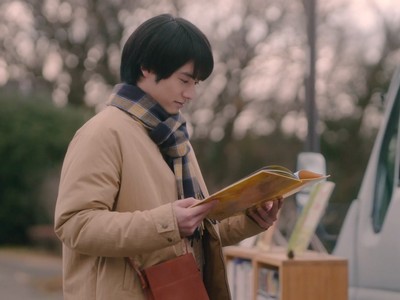
If you're an optimist, it's easy to pretend the Cherry Magic movie has a feel-good ending. After all, the story portrays an idyllic wedding day for the protagonists, celebrating their love jubilantly. Aww, look at their suits, the confetti, and the storybook illustrations! The optics are so dreamy. The final scene is subtle enough that it won't shatter the fairytale fantasy unless you look for the cracks. You can leave the film believing Adachi and Kurosawa are a happily married couple.
Sadly, their matrimonial bliss is an illusion. The last scene introduces a twist, adding ambiguity to the previous events. It implies the wedding may be a figment of Adachi's imagination, spurred by the book he read. Before the film ends, he stops daydreaming and returns to reality. The leads don't live in a BL utopia with princes, wizards, or equal rights. Instead, they're a gay couple in Japan, which doesn't recognize same-sex unions. Adachi and Kurosawa can never marry. Their proposal, wedding, and marriage are make-believe according to the law.
Cherry Magic maintains the fantasy and never explicitly states the characters haven't married. However, it leaves subtle hints. Adachi's narration speaks cryptically about the absence of "happily ever after" in his love story. If you look closely, the leads don't wear wedding rings. Also, the movie relies on the audience's skepticism. Some viewers see the glass as half-empty and will question the validity of this fictional marriage. Do you have the optimism to believe in this fairytale romance? Or are you sensitive to the harsh reality that gay couples can't get married in Japan?
Fantasy vs Reality
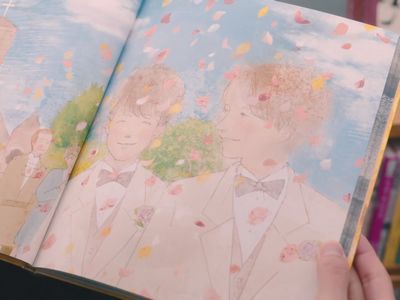
Cherry Magic! The Movie aired in April 2022. Yuu Toyota, the story's creator, stated some of the profits will go to Marriage For All Japan, an organization dedicated to marriage equality in the country. Subsequently, the Japanese government still bans gay couples from getting married. To this day, Taiwan remains the only country in Asia to legalize same-sex marriage. In contrast, Japanese activists must continue the long journey to achieve an inclusive society.
I state these facts to describe the reality of Adachi and Kurosawa's world. The Cherry Magic series may have started as a whimsical fantasy, but this movie shatters the illusion. As Adachi describes it, the fairytale spell is broken. Adachi isn't a wizard, and Kurosawa isn't a prince. Instead, they're just two regular guys in a loving relationship. They're committed to spending the rest of their lives together. Yet, they don't receive the same spousal rights as heterosexual couples. Adachi can't become an ordinary guy after falling in love. Society tells him that his status isn't equal to everyone else.
Life is not a fairy tale. There's no magic, no prince charming, and no fantasy wedding. The happily married gay couple exists in storybooks, requiring imagination to believe they're real. Sure, we can pretend Adachi and Kurosawa tied the knot in a parallel world. Cherry Magic maintains the enchanting romance and doesn't confront viewers with explicit unhappiness. However, there's a grim reality behind the cozy illusion. The protagonists face inequality, discrimination, and an invalid marriage. Once you stop fantasizing, the movie's ending feels a lot more solemn.
Journey
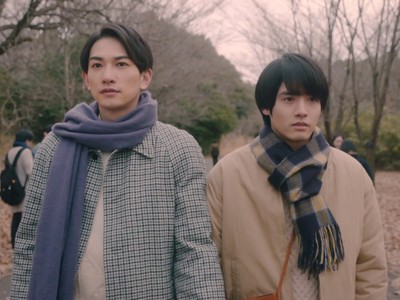
The last scene in the Cherry Magic movie is thoughtfully crafted despite the simplicity. It begins with Adachi and Kurosawa on an outdoor date, walking side by side. Eventually, they hold hands. It's the first time they've displayed public affection. Their past intimate moments were in private settings. As your eyes focus on their hands, you may notice they don't wear their wedding rings. The movie leaves the interpretation open regarding the validity of their marriage.
The camera focuses on their backs, encouraging viewers to see from the characters' perspectives. The film asks us to relate to this couple. How would you feel about holding your same-sex partner's hand in this situation? Many people are around them, and a few spectators glance in their direction. The movie reveals Adachi and Kurosawa's faces. Both wear neutral expressions without smiling, talking, or looking at each other. If we can read their minds, what are they thinking right now? Are they tense, nonchalant, or simply trying to maintain their composure?
In the final shot, Adachi and Kurosawa trek down a long road. Initially, they go in the opposite direction as the other pedestrians. Later, everyone walks in the same way as them. The visual representation hints at the couple's promising future. They may stand out initially, going against a heteronormative society. As the foot traffic changes, it symbolizes the tide of opinion. Over time, there's growing acceptance by the public. The movie also highlights how Adachi and Kurosawa continue on this emotional path together. These lovers will support each other on a lifelong journey.
Cherry Magic Series
Series
Cherry Magic
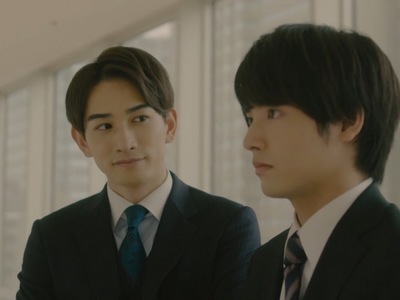
Cherry Magic! The Movie is the sequel to the 2020 Japanese drama Cherry Magic. The original story is a 12-episode series that started on October 9, 2020 and ended on December 25, 2020. It became an international hit. Cherry Magic was extremely well-received among BL fans and catapulted the two actors' careers.
You should watch the original Cherry Magic series before the movie. The story is about a quirky workplace romance between two office colleagues. Adachi is a 30-year-old employee with no romantic experience. One day, he gains a magical ability and can hear people's thoughts whenever they touch him. Adachi discovers his seemingly perfect coworker, Kurosawa, harbours a secret crush on him. Each episode is funny, sweet, and imaginative. I highly recommend Cherry Magic to any BL fan. Although the movie sequel isn't as vibrant, it's still a decent follow-up for the beloved franchise.
Cherry Magic Thailand
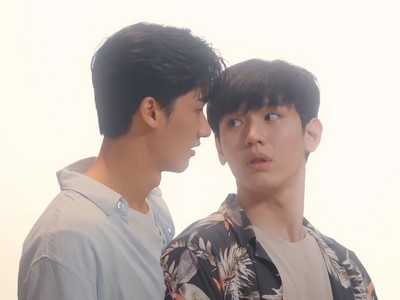
Cherry Magic Thailand is a Thai remake of the Japanese drama. It has a total of twelve episodes and can be finished in ten hours. This series has a premise similar to the original. It adds new storylines, changes several ideas, and expands on the secondary characters. The Thai remake includes the plots from both the original Japanese drama and the movie sequel.
Cherry Magic Thailand offers a unique twist on the tale. It has a dazzling romance with a daring portrayal of physical affection and LGBTQ+ themes. The writing is less graceful in the Thai version. A few plots and secondary characters diminish my enjoyment. Nonetheless, I adore the lead couple so much. Achi and Karan have the cutest romance, outshining even Adachi and Kurosawa. The Thai series also benefits from its longer length. It can explore the characters and themes more extensively than the original drama and movie. Nonetheless, I love both versions of Cherry Magic.
Cherry Magic Movie Information
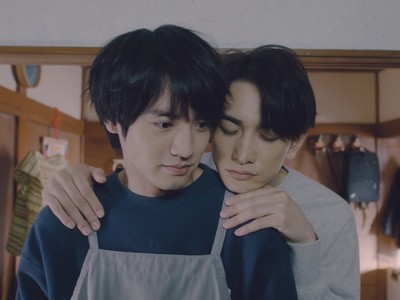
- Start Date April 8, 2022
- Movie Length 1 hour and 45 minutes
Cherry Magic! The Movie is a Japanese movie that released on April 8, 2022. It is a long film, which you can complete in around 105 minutes. Riko Sakaguchi (坂口理子) is the movie director.
Cherry Magic is a movie adaptation. The original story is a Japanese manga by Yuu Toyota (豊田悠).
Links
- Instagram Cherry Magic Instagram
- MyDramaList Cherry Magic Movie MyDramaList
- Website Cherry Magic Movie website
- Wikipedia Cherry Magic Movie Wikipedia
- Wikipedia 30歳まで童貞だと魔法使いになれるらしい Wikipedia
- YouTube Cherry Magic Movie YouTube
I agree with your above review.
Regarding kissing scene -/well lack of. — I had read somewhere that one of the leads -older one-didn’t want to kiss another male -maybe he shouldn’t have accepted a BL role
MAJOR SPOILERS: The first time I saw this movie, I was confused by the beginning and annoyed by the ending. I loved the TV series and thought the movie cheated by ignoring the way the series wrapped up. Wasn't Adachi supposed to have had sex with Kurosawa on Christmas Eve and thus lost his “magic” as the legend had it? Now, we're back in Kurosawa's apartment, Adachi is all jittery so they DON'T have sex, and Adachi keeps his magic? Huh? And then the dreamy “wedding” at the end with friends, families, and colleagues cheering them on? So unrealistic.
But your explanation of the ending cleared it up for me. That wedding was indeed a dream. In the real world, Kurodachi are going to have to make their way through life without much in the way of support or recognition – what that final walk symbolized. (This really resonated for me since I am married to a Japanese but our marriage is not recognized in Japan since we're both men; we got married in the States.This has caused headache and heartache for us.) Not only was the wedding a dream; so was everything that happened in the last scene of the series (admittedly, signaled in the movie by the “rewind” of those last few minutes of the series but I had sort of missed that.)
After reading your review, we watched the film again (we have the DVD) and I liked it much better the second time around – perhaps more than you did. I would have given it an A-) The whole conceit of Adachi's “magic” had worked well as a metaphorical plot device in the series by allowing the story to explore what happens to someone who is, objectively speaking, about as lovable as it is possible to get (sensitive, serious, kind, responsible – not to mention drop-dead gorgeous) but has NO idea that he IS lovable until some accident allows him to see himself through the eyes of others. But the “magic” also works in the movie as a way of showing why physical intimacy is a necessary precondition to total trust and all other forms of complete intimacy – because you can't hide your real feelings during sex. It is the absence of physical intimacy that permits the dishonesty that Adachi and Kurosawa display about the former's transfer to Nagasaki; the sex they do finally have – must have, really – is what breaks down the dishonest shells each has built around his feelings for the other. The film handled this very well. No, the sex was not depicted – and, as you noted, even the kiss that preceded it was mostly obscured – but the afterglow and the concomitant beginning of complete honesty between the two was very well done (Akaso Eiji is such a superb actor – he perfectly captures in the “morning after” scene in bed, the fatigue-cum-bliss that comes from finally surrendering to the full force of love; a much more nuanced and honest treatment than in episode 12 of the series which we now understand was just a dream.)
I was much less bothered than you were by the way the kiss was handled. Both the series and the movie treat kissing and sex the way Jane Austen does – you know it happens, or will happen, and is the ultimate motive power for everything ELSE that happens, but it all takes place beyond the purview of the viewer (or reader). I find it unlikely, as another of your respondents suggests, that Machida Keita (Kurosawa's actor) refused to kiss another man – and that's not just because it is beyond my power to conceive how anyone with a pulse would pass up the opportunity to exchange two minutes of passionate kisses with Akaso Eiji. The whole film (and series) deals with such matters obliquely; it is enough for the purposes of the movie for me to know the kiss took place, much as I might have gotten off on reveling in every last drooling detail.
I also took a bit of umbrage at your characterization of Kurosawa's mom as a “bigot” and a “homophobe.” She grew up in a world in which passionate friendships among men (or, for that matter, among women) were honored and celebrated (to a degree unmatched in the West at least since the end of the Victorian era) but not in ways that precluded or substituted for heterosexual marriage, which was as much a filial duty as it was a means of personal fulfillment.
A subtle but real clue to this underlying shift in social mores lies in the different circumstances, respectively, of Adachi's and Kurosawa's families and thus in the different ways their parents – particularly their mothers – react to being confronted by the reality of the determination by the two to spend their lives together. (Both mothers, incidentally, are played by well-known actresses – better known than either of the stars were before the series became a runaway hit. That the producers could persuade the two women to take these parts is prima facie evidence of what a hit the series was. I was living in Japan when Sakakibara Ikue, who plays Adachi's mom, burst onto the scene with her 1978 mega-hit, Natsu no Ojoosan
https://www.youtube.com/watch?v=F15OxXO8Zao )
Adachi's only sibling is shown as happily married with a little daughter – and living with Adachi's parents. Meanwhile, Kurosawa tells us HIS only sibling (an older sister who would thus be at least 32 years old ) has gone “abroad” with her “boyfriend.” So Adachi's parents know that one of their children has made a traditional marriage (and a happy one – at least that's what we're shown) and has given them a grandchild. That makes it a lot easier to accept that their other child will not. Not so Kurosawa's parents who are suddenly confronted with the reality that the chances are neither one of their children will have a traditional marriage and that they will probably have no grandchildren. ( This kind of situation is not, of course, unique to Japan – it's a hell of lot easier for the parents of gay kids anywhere to accept their kids for what they are and whom they love if another of their kids is straight, happily married, and with children of his or her own.)
More broadly, Kurosawa's mom's internal conflict hints at a wider problem: the rapid decline in the number of marriages in Japan, the growing numbers of young people who claim no interest in sex or any kind of deep relationship (Adachi starts out this way and Fujisaki re-iterates it in the movie) and the concomitant collapse of the Japanese birth rate. This explains some of the opposition to SSM – it's not just “homophobia” but real fear for the future of the country as young people refuse to marry and have children. Marriage is not just a means of providing for individual stability and happiness but also a social institution essential to securing the future (in crass economic terms, who is going to support Japan's aging population as they retire?). Of course opposition to SSM does nothing to boost Japan's birth rate – it's not as if either Adachi or Kurosawa are going to rush out, take brides, and start having kids if they're not allowed legally to marry each other. In fact, one could argue that the whole BL genre is helping to resurrect the honoring of commitment and intimacy necessary to halt the alarming decline of marriage in Japan, since the genre so openly celebrates “old-fashioned” notions of courtship and love (with Cherry Magic an outstanding example). But the unease and opposition Kurodachi have to deal with is not just a matter of bigotry – there are wider issues at stake.
As there are in the one large matter that the film leaves unresolved: the future careers of the two principals. Adachi wants to make himself invaluable to the company so they won't dump him when his colleagues and superiors find out about his relationship with Kurosawa. But if he were a woman, he would face exactly the same challenge – iow, again, we're not just dealing with homophobic bigotry here.
(Kudos to both series and film for honoring the original premise of the BL genre from its origins in the shojo manga – girls' comics – of the 1970s: a world in which the homosexual identity does not exist. Rather, people fall in love with other people and sometimes those other people are of the same sex. Kurosawa does not “come out” to his parents as a gay man, he “comes out” as loving Adachi and wanting to spend his life with him. This was in fact the situation in Japan before the introduction of Western notions of sexual identity in the Meiji period; no one thought to label people on the basis of what kinds of other people attracted them; THE book on the subject in English is Gregory Pflugfelder's Cartographies of Desire: Male-Male Sexuality in Japanese Discourse, 1600-1950. The BL genre posits a world in which the older understanding of human sexuality had persisted, at least in Japan; the Thais seem to be moving in the BL films I've watched towards dealing with one's sexuality rather than dealing with loving this particular person, which raises the question of just how the BL genre is supposed to differ from standard LGBT fare. Indeed as you know, BL was attacked in the 1990s by some Japanese gay activists for misrepresenting gay life in Japan. But then that's not what BL set out to do. Its purpose, rather, was to explore possible alternative modes of conceptualizing sexual attraction and love.)
Secret romantic relationships between colleagues in any kind of organization are “problematic” as they say, and that's true irrespective of the sex of the people in those relationships. In the traditional Japanese company or bureaucracy, relationships between men and women often happened and were even encouraged if they led to marriage – because the woman would have an understanding of the demands the organization would be making on her future husband. But the women in question were not management track hires; they were hired as clerical help and were expected to leave the organization when they became pregnant with their first child.
But now that women are increasingly being treated as full equals of their male colleagues with comparable responsibilities and expectations (e.g., Fujisaki), the old mores no longer work so well – another explanation for the collapsing marriage and birth rates; the “company” was the traditional marriage hunting ground for both men and women. You can't have a situation where two people in love with each other – openly married or not – can work closely with colleagues and superiors. So, again, CM is raising an issue that applies far beyond the challenges unique to gay people. Either Kurosawa or Adachi will probably have to leave the company – which one of them does so and where they go and how they deal with inevitable career/personal life conflicts would be true, as noted, even if one were a woman like Fujisaki. I would really like to see a sequel that explores this issue – just what are Kurodachi going to do when someone at work other than Fujisaki figures out that they are now a couple? — and for that reason I'm glad the movie left the question unresolved.
The film did touch on the issue with Adachi's temporary transfer to Nagasaki, although I thought that was a bit overdone. It would be one thing if it were an open-ended transfer, particularly if it were abroad. But for eight months? In a place that's a 90 minute flight away? Come on. (The film does show Adachi booking a flight back to Tokyo, presumably to spend time with Kurosawa, just before his “accident.”) But at least the film raised the issue (you'll recall how TOTS and Bad Buddy dealt with it.)
One more minor quibble – when they decide to live together, why do they move into Adachi's apartment rather than Kurosawa's? The latter is larger, nicer, and as we learned in the very first episode of the series, much closer to the office. I read somewhere that the TV production team had to rent the set for Kurosawa's apartment – why episodes 2 and 11 where filmed on the same day – while the set for Adachi's was available whenever the producers needed it. Still, writers ought to have figured out a way around this plot hole.
Overall, though, while I agree that the film lacked the “zany humor” as you put it of the series, I respect and admire the way the film deepened the story and touched on real and serious issues. And again, the acting and the production values were first rate.
(I continue to enjoy your site and am so grateful for all the work you put into it. I really hope you keep it up.)
Hi! I loved your review and I've rewatched it.
Adachi is wearing the ring in both park scenes (reading the book!).So the proposal happened and the "wedding" scene may have happened.
My initial understanding was that the "wedding" scene was a celebration of a partnership. The scene was rushed due to COVID constraints (my guess) and not well edited to their own standards.
I do still think this way and let me explain why:
Several elements made the series a classic, but what made it work is someone low self-esteem humble and empathetic Adachi getting a magical ability to confirm (to mind read) a confident, successful, relationship-material Kurosawa that is interested in him – while at a workplace setting/"sweet daily life".
2 personalities that are easy to love by everyone; realism + magic = relatable, but also hope/good feels/humour. I agree that the magic made me feel "GOD, this whimsical relationship is not real life, real life sucks, but this show is lovely". The dialogue/character's struggles were strokes of realism; – needed for a show to be relatable.
If these elements were important for success, they wouldn't want to lose that in their sequel, even if they mainly wanted to show the couple/individuals maturing .
So in my opinion they reverted "Christmas" day because they needed the magic to pull off the movie.
The series is a "rebuttal" to straights/gays, as it explored a relationship developing with boundaries, kind thoughts, emotional fragilities and healthy behaviors of love, portrayed by men that cannot get married. The film deepens their individuality- Adachi seems resolute and Kurosawa learns to get his "emotional world" really out and be judged/understood.
The ending scene captures the initial anxiety of the simplest gesture of holding hands, but it is permeated by Kurosawa calling Adachi, now not an ordinary 30s life – they are each others home and that made significant strides to be sure of their love:
"Because we wеre born separately/I want you by my sidе for the remainder of my life
A zig-zagging winding road/We’ll choose one future with our two hearts
We’ll be a pair that needs no goodbyes/ Heartbeats that overlap with “I’m home” and “Welcome back”
With every second, until we’re wrinkled/ I want to hold your hand
P.S: All translations related to the fairytale monologue, stated that " in a fairytale the curse/magic spell gets broken and you live a happily ever after; BUT I think that after the curse/magic spell gets broken I would get to live a 30s ordinary life, HOWEVER I was wrong." When Adachi got the magic he 1st avoided people (didn't use it) + researched how to get rid of it » [ep 2] Kurosawa happened 🙂 » [ep 2-10] Adachi got afraid of being dependent on the magic » [last episodes+part of movie] then got afraid of actually losing = 30s ordinary life that couldn't sustain their relatioship.
In the end, he admits he was wrong, and in a way he is living a happily ever after losing the ability (he never stated that a happily ever after happens post marriage; IF we ignore the book's fairytale imagery)
Great review as usual, by I want to point something out. The proposal happened. The marriage may or may not be a figment of Adachi\'s imagination. At the beginning of the movie, you can see the wedding ring on Adachi's left hand when he went to grab the books. It still is there by the ending scene.
As for the "or so I thought". I think what he meant here was that he thought he was going to be an ordinary 30yo man due to the spell being broken but in the end, he wasn't an ordinary man because he got his happy ending with Kurosawa. This was also implied in the series as him losing his magic would turn him back to the ordinary man that he was (his life before having a relationship with Kurosawa) but we know what happened in the movie.
😊 I agree with everything else though. Great read!
I am a watcher from the states and I loved the live action series. Where can I buy or watch the movie? I’ve been trying to find it but I need English subtitles. Can anyone help me? I appreciate any help.